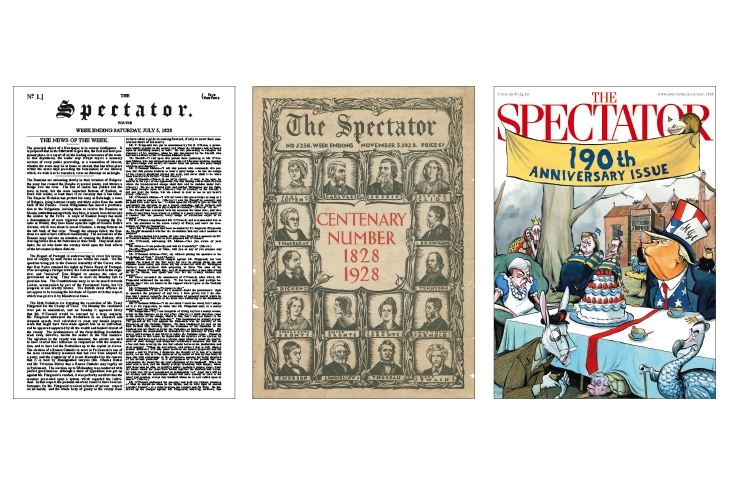Although The Spectator (literally) defined ‘The Establishment’, it has never been its organ. In fact, it was founded as a vehicle for root-and-branch reform that sought from the outset to upend the establishment. Its first editor, the Scottish firebrand Robert Stephen Rintoul, argued that, in spite of the magazine’s pointedly chosen title, ‘It is difficult to be a mere spectator in times like these.’ Its pages complained bitterly about an out-of-touch establishment: that too many ‘of the bons mots vented in the House of Commons appear stale and flat by the time they have travelled as far as Wellington Street’. The remedy it sought was the Great Reform Act, whose passage in 1832 it helped secure.
For the first 100 years of its existence, The Spectator was resolutely anonymous. It spoke with an inscrutable editorial ‘we’, transcending any one individual. Behind this veil, regular staff writers rubbed shoulders with the likes of J.S. Mill, Walter Bagehot and Thomas Carlyle. The magazine rapidly acquired the reputation of being the best informed on political affairs, offering more sustained (and statistically supported) criticism than other newspapers. When Bagehot was editing the Economist, he tellingly remarked: ‘I go round to The Spectator office to know what is going to happen.’
The Spectator also made its name as an infamously stern critic of the arts: its independence of political party was matched by a disdain for pushy publishers. While George Eliot, Thomas Hardy, Rudyard Kipling and Joseph Conrad were hailed as heroes, the writings of Bulwer-Lytton were ‘baby-fancy’, Tennyson’s ‘namby-pamby’, Dickens’s ‘vulgar and detestable’ and Emily Brontë’s ‘too coarse’. To Charlotte Brontë, a bad review in The Spectator was all the worse because of its influence. ‘Most future notices will in all likelihood have a reflection of The Spectator in them,’ she wrote, after one gentle trashing. But ‘if Jane Eyre has any solid worth in it, it ought to weather a gust of unfavourable wind’. Undaunted, however, many a literary lion has joined The Spectator pride – John Buchan (assistant editor), Graham Greene (film critic and literary editor), John Betjeman and Lionel Shriver (columnists). Among the infinite list of occasional literary contributors stand T.E. Lawrence, Aldous Huxley, H.G. Wells, T.S. Eliot, Evelyn Waugh and Ian Fleming.
Despite its deep-rooted tradition, The Spectator has always been eclectic: its writers have included princes and prisoners, prime ministers and prime donne. But there are always battles to fight — and many from the 19th century have recurred in the 21st. Just as The Spectator defended the UK against Irish Home Rule in the 1880s, so it was with the Scottish Referendum of 2015. Just as Rintoul complained to the Crown Court in the 1840s that papers should not pay cynical legal costs when cleared of libel charges, so we resisted David Cameron’s attempts to impose these costs on publications which do not bend the knee to a state regulator.
It is an unbroken rule of publishing that magazines do not last for 10,000 issues. Look at the small print on The Spectator’s contents page, however, and you will see that you are holding the 9,906th number. So yes, the 190th birthday is a milestone, but another is in prospect. Rintoul said that The Spectator was ‘planned on a great scale and for long endurance’. So far, so good.






Comments